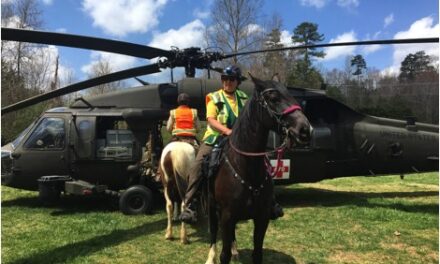As of July 8, Maryland had 189 confirmed cases of rabies, including one horse, for 2013. In a recent incident in Thurmont, according to the Frederick County Health Department, a man was bitten by a rabid fox on July 4, and a few days later a rabid fox had an altercation with domestic dogs.
Rabies is a viral disease that is spread by the saliva of the infected animal during bite contact. Human cases of rabies are usually fatal if untreated. Symptoms of rabies in any animal can include fear of water, limping, salivating, unusually friendly or aggressive, or other atypical behaviors such as seeing nocturnal animals during the daytime.
If you see the stray or wild animals acting abnormally, avoid contact and do not attempt to handle it, and call your county’s animal control division.
According to data released by Merial (makers of a rabies vaccine), there are 12 confirmed equine rabies cases for 2013 (so far). From Merial:
“In 2011, which is the last year for which we have complete data, there were 44 confirmed cases of rabies in horses.2 But what really should be a concern for horse owners is the number of cases in wildlife as most horses are kept in areas near wildlife habitats,” says Megan Green, DVM, equine specialist, Merial’s Large Animal Veterinary Services. “I’m sure every barn owner has seen skunks, foxes, raccoons and the occasional bat in and around their barns.” Besides the cases in horses, in the past several years, there have been thousands of incidents of animals with confirmed rabies, 92 percent of which were in wildlife2:
2009 – 6,694
2010 – 6,155
2011 – 6,037
Unfortunately…rabies is always fatal. Clinical signs include, but are not limited to, going off feed, depression, excessive salivation, difficulty swallowing, lack of coordination, aggressive behavior, hyper-excitability, colic, convulsions or paralysis. These signs are similar to other diseases affecting the horse’s nervous system, but in the case of rabies, become so severe, the horse is euthanized or dies within days.
Because there is no way to diagnose rabies in live animals, horse owners and the treating veterinarians who suspect rabies face the gut-wrenching task of sending the horse’s brain to a diagnostic laboratory where it is examined for the presence of lesions which are characteristic with rabies.
“Horse owners have significant emotional and financial resources invested in their horses over long periods of time and consider their horses to be family,” says Dr. Green. “Their vision for the animal’s end of life tends toward retired days grazing in green pastures – not convulsions, paralysis and a painful death.”
Rabies brings significant heartache to horse owners and can be avoided with just one simple step – vaccination. “The cost associated with a rabies vaccination is minimal – and the peace of mind it buys is priceless,” says Dr. Green.












